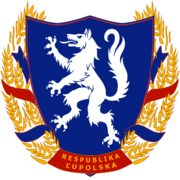< User:Luepola | Vasarden archive(diff) ← Older revision | Latest revision (diff) | Newer revision → (diff)
March of Victory (Luepolan: Marš Pobiede [ˈmaɾʃ pɔˈbi:de]) is the national anthem of Luepola. Its lyrics were written by Slobodăn Ković in 1828, in the form of a poem that was later adopted as a popular song among the Luepolan populace, who had recently overthrown the Luepolan king Ratimir II and established the First Luepolan Republic. Various composers of the era composed renditions of the poem, but the composition by the Borish composer Laurens van Overhus became the most beloved among the Luepolan populace; his composition, paired with a slightly altered form of the lyrics, was formally adopted as the anthem of Luepola by the Sliet in 1838.
Official uses
Luepolan radio and television stations, by convention, play the anthem at the start and end of their daily broadcasts if the station does not broadcast 24/7. 24/7 stations instead play the anthem at 8:00 AM and 8:00 PM. The first stanza of the anthem is also sung at most official events involving the government or an otherwise national organization.
Lyrics
|
|
Phonetic transcription (IPA) |
|
Hajde združima hvalu dajati
stranu sovránu slobodneg ľudí
kde mi držima voľu najvažni,
ukúda sve tiraňe kiđali.
Iako mi se-tomili v okovah,
ruku Neg krétal Otăc najsvéti.
Niňe se-ležu lomani v poľah,
nikad više naš narod ugnesti.
|
[xajde zdɾuˈʒima
xvalu daˈjati]
[stɾaˈnu sɔvɾa:nu
ˈslɔbɔdneg ˈʎudi:]
[kde mi dɾˈʒima
vɔʎu najˈvaʒni]
[uˈku:da sve
tiɾaɲe kiˈɟali]
[ˈjakɔ mi se tɔmili
v ɔˈkɔvax]
[ˈɾuku neg kɾe:tal
ɔtɐ̆ts najˈsve:ti]
[niɲe se ˈleʒu
lɔmali v ˈpɔʎax]
[niˈkad viʃe naʃ
naˈɾɔd ugnesti]
|
Let us join together to give praise
to our sovereign country of free peoples
where we hold our freedom most dear,
and whence the tyrants have been cast.
While we languished in the chains of tyranny,
The hand of the Holy Lord moved.
Today the chains lie shattered in the fields
Never again to constrain our people.
|
Ľupolski narod,
Pobieda bližé!
Za boj spremite!
Ej, hajde na hod!
|
[ʎupɔlski ˈnaɾɔd]
[pɔbi:da ˈbliʒe:]
[za ˈbɔj spɾemite]
[ej xajˈde na xɔd]
|
Luepolan nation,
Victory is at hand!
Prepare for the battle!
Hey, let's get going!
|
Gorah i riekah ťema maršati,
i valah mořev ťema plavati.
Ali s puškeme, ali s srpime,
se-sújeđinu v rátnu družine.
Jak Međavláda priedoka davneg
rátničnu dušu vi sam že nosé.
Znaja istoria pobiede naše,
i koda nudžăn, opét ona ťé.
Refrén
|
[gɔɾax i ˈɾi:kax
cema maɾʃˈati]
[i ˈvalax mɔr̝ev
cema plavati]
[ali s puʃˈkeme
ali s sɾˈpime]
[se ˈsu:jeɟinu
v ɾa:tnu dɾuˈʒinu]
[ˈjak meɟavla:da
pɾi:dɔka ˈdavneg]
[ˈɾa:tnitʃnu duʃu
vi sam ʒe ˈnɔse:]
[znaja iˈstɔɾia
pɔbi:de ˈnaʃe]
[i ˈkɔda nudʒan
ɔˈpe:t ɔna ce]
|
Over rivers and mountains we will march,
and over the seas we shall sail.
Whether with a rifle, or with a sickle,
everyone is gathering into their warbands.
Like our ancient forefather, Medivold,
So too do you harbor the warrior spirit.
History has testified to our victories,
and when necessary, will do so once more.
Chorus
|
V visotih Sztrojeka pobiedali
nepobiedivne legione Đorske.
Po kraju Vosporođ' ostojali
neostajavne Véseske sile.
Mlávianski narod, pobiednik vhoda,
čé slave ciela Patirija znaja,
čeja slava tisúti liet živé,
i ťe poživi tisúte više.
Refrén
|
[v visɔtix stɾɔˈjeka
pɔbi:dˈali]
[neˈpɔbi:divne
legjɔne ˈɟɔɾske]
[pɔ kɾaju ˈvɔspɔɾɔɟ
ɔstɔˈjali]
[neˈɔstajavne
ve:seske ˈsile]
[ˈmla:vjanski naɾɔd
pɔbi:dnik ˈvxɔda]
[ˈtʃe: slave tsi:la
patiɾja ˈznaja]
[tʃeja slaˈva
tisu:ti li:t ˈʒive:]
[i ˈce pɔʒivi
tiˈsu:te viʃe]
|
In the heights of Sztrojek we slayed
the invincible legions of Deora.
At the edge of Votania we halted
the unstoppable Veisic might.
The Molvic nation, the victor of the east,
whose glory is renowned across Patyria,
whose glory has lived for a thousand years,
and will live for many thousands more.
Chorus
|
Song of the Prishekers
A derivative of the song, most popularly known as the Song of the Prishekers (Luepolan: Piesăň Priške) was adopted by the Communist Party of Luepola as its anthem in 1892, and became a popular song of protest among the many Luepolans dissatisfied with the reigning government. It became the country's national anthem following Lev Gincburg's consolidation of power in the newly-established People's Republic of Luepola. The song was later translated into many other languages, as Flecquism spread globally.
